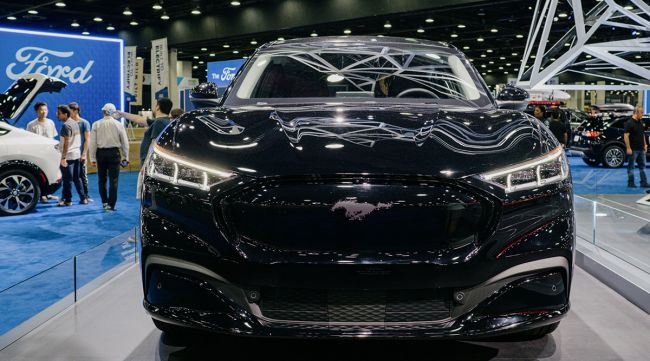The Ford Mustang Mach-E on display at the 2022 North American International Auto Show in Detroit. (Erin Kirkland/Bloomberg News)
Ford Motor Co. is joining with South Korean battery-component makers SK On Co. and EcoPro BM Co. to build a cathode active material plant in Quebec worth more than C$1.2 billion ($887 million).
The Canadian and Quebec governments are providing loans of C$644 million for the facility in Becancour, which will create at least 345 jobs and serve Ford’s factories in Canada and the U.S.
The project announced Aug. 17 is the latest investment by a corporate giant in the small community northeast of Montreal, which aims to become a crucial hub for the North American electric vehicle supply chain.
Becancour is emerging as a “strategic location” for cathode active materials, and the Ford plant will help consolidate the EV ecosystem being built in Quebec and Ontario, according to Canadian Industry Minister François-Philippe Champagne.
“I think this is going to be noted around the world because now an accumulation of key players are choosing Canada to build their factories. It’s very significant,” he said in an interview.
The EcoPro CAM Canada facility is expected to begin operations in the first half of 2026 and produce an average of 45,000 metric tons of cathode active materials each year.
The public funding is broken down into a conditional loan of C$322 million from the Canadian government and a partially forgivable loan for the same amount from Quebec.
It was first revealed last fall that Ford and the Korean firms were discussing building the plant in the French-speaking province. The companies had earlier agreed to invest in a North American production facility that would supply batteries for a joint venture between SK On and Ford in Tennessee and Kentucky.
Ford’s announcement follows news in May that General Motors Co. and Posco Future M Co. secured half of the financing for a C$600 million battery plant in Becancour. Germany’s BASF SE and Brazilian miner Vale SA have also committed to invest in the region.
Canada has enthusiastically backed the U.S.-led bid to erode China’s dominance in electric vehicle manufacturing. The Inflation Reduction Act has boosted the price tag significantly for Prime Minister Justin Trudeau’s government, however, forcing it to match billions in U.S. subsidies to lure automakers Stellantis NV and Volkswagen AG to Ontario.
Champagne argued the investments will pay dividends for decades to come.
“It’s only once in a lifetime you see a major shift in technology, in respect to the automobile, from a combustion engine to an electric engine, and that’s why you’ve seen me so active to make sure we land these deals in Canada,” he said.
“These opportunities only come once in a generation, but the benefits are going to be multigenerational.”






